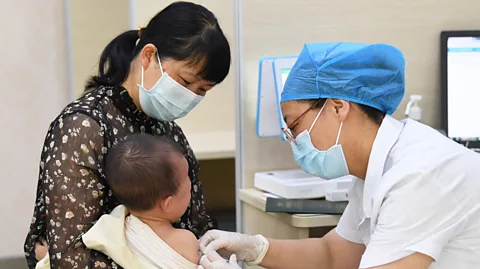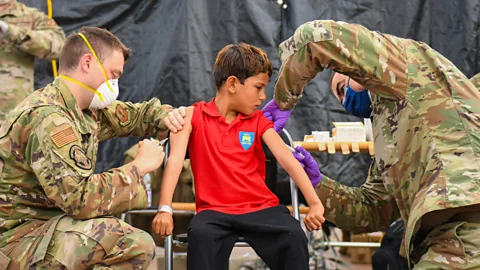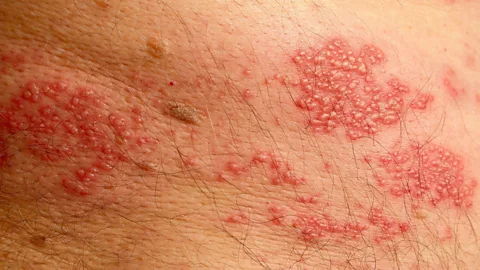Why don't some countries vaccinate against chickenpox?
 Getty Images
Getty ImagesFor decades, it was thought that not vaccinating children against chickenpox would reduce the risk of adults developing shingles – but now this is being questioned.
On Easter Sunday 2009, Angie Bunce-Mason noticed that her three-year-old daughter Elana had developed a rash on her body – the tell-tale sign of chickenpox, the common childhood infection which is caused by the varicella-zoster virus.
Her older brother, then six, had contracted chickenpox a week earlier and recovered normally. As an otherwise healthy infant, Bunce-Mason assumed that her daughter would also have few problems. "Like many parents, I just viewed chickenpox as a part of childhood life," she recalls. "I had never heard of anyone experiencing any problems, so I wasn't worried. I even commented to my husband that I was glad she would be getting it out of the way before starting school," she says.
But as the week went on, Elana became worryingly lethargic. On the Friday night, her parents took her to see a doctor who diagnosed her with possible pneumonia. She was rushed to accident and emergency where she went into cardiac arrest a few hours later. By 7am Saturday morning, Elana had died. A pathology report found that the virus had spread to her lungs and wreaked widespread damage, causing lesions which proved ultimately fatal.
"The doctor who performed the post-mortem said that Elana had the worst case of chickenpox that he had ever seen," says Bunce-Mason, who has spent most of the past 15 years attempting to raise awareness among parents and health professionals that chickenpox, a disease encountered by almost all children during their first five years of life, can turn fatal.
One reason why chickenpox is so ubiquitous, particularly among young children whose immune systems are still developing, is the sheer contagiousness of the varicella-zoster virus, which can be transmitted both through the air and through contact with the blisters, saliva, or mucus of an infected person.
But while most infected children recover within one or two weeks, complications can occur. The most common are bacterial infections of the lesions on the skin, which can penetrate the soft tissue and reach the bloodstream, resulting in potentially deadly conditions such as necrotising fasciitis, sepsis and toxic shock syndrome. But the varicella-zoster virus itself can also progress to the lungs and the brain, resulting in pneumonia, stroke, and brain inflammation, otherwise known as encephalitis.
"Severe bacterial infections can occur because the chickenpox spots weaken the defences of the skin and the lining of the throat, letting dangerous bacteria invade the skin or bloodstream," says Andrew Pollard, professor of infection and immunity at the University of Oxford. "The main bacterial superinfection culprit is Group A Strep, the same germ which caused the surge in serious intensive care admissions [in the UK] last year," he says.
Such complications are more common than many realise, particularly in adults who never built up immunity through experiencing chickenpox as a child. One epidemiological survey in France found that severe chickenpox-related complications occurred in 3% of under 15s, and 6% of over 15s. In total, 65 people of all ages died from chickenpox in the UK between 2015 and 2020, while even in the US, where vaccination is common, there are still around 30 deaths from chickenpox every year. The World Health Organization (WHO) has previously estimated that there are approximately 4.2 million cases of severe chickenpox-related complications around the world each year, and 4,200 related deaths.
 Getty Images
Getty ImagesThe frustration for affected families is that since the late 1980s, there has been an effective chickenpox vaccine available. But while this has been implemented into childhood immunisation programmes around the world in the US, Hong Kong, Australia and multiple European countries, other nations including the UK, have been far more reticent.
"I feel that this is largely an economic issue," says Bunce-Mason. "To me this is very short sighted. Firstly, in economic terms, sick children mean parents requiring time off work, which impacts on productivity. But also you have to think of how many children's lives could have been saved and how many families could have been spared from a life of grief."
However, the decision not to vaccinate children against chickenpox is down to more than budget constraints – in many parts of the world, it's a calculated risk that aims to prevent disease in a different group: older adults.
The shingles dilemma
The story of the chickenpox vaccine dates back to the early 1970s when a Japanese virologist called Michiaki Takahashi isolated a strain of herpes virus, which would become known as varicella-zoster, in a three-year-old boy.
This helped yield a vaccine which was initially approved in Japan in 1986, before one became available in the US in 1995. Anne Gershon, professor of paediatrics at Columbia University in New York, recalls how before it was introduced, there would be rare but horrific cases of children who recovered from leukaemia, but later died of chickenpox as their immune systems were too weakened to fight off the infection. "While it's usually a mild illness, it may be severe in immunocompromised children," she says.
Overall, the US Centers for Disease Control and Prevention estimate that during the first 25 years of the chickenpox vaccination programme, the jab prevented an estimated 91 million cases, 238,000 hospitalisations, and 2,000 deaths. While numerous countries have since followed suit, with Australia funding the varicella vaccine under their National Immunisation Programme in 2005 and Israel making varicella vaccination mandatory for children in 2008, there are still many countries that remain reticent to incorporate it as a routine childhood jab. This includes the UK, France, Denmark, Portugal, Norway, and Sweden.
So why the reluctance? Some of the concerns have stemmed from the potential consequences of vaccine hesitancy, which was named as one of the top 10 threats to global health by the WHO in 2019. If a large proportion of children are receiving the varicella vaccine, then the virus will no longer circulate to the same extent in the community. This could leave any unvaccinated children more susceptible to contracting the virus for the first time as adults, where the consequences can be more severe, especially in pregnant women as there is a risk of the virus harming the unborn foetus.
But the biggest fear has been lingering concerns that chickenpox vaccination might increase the risk of shingles among unvaccinated individuals in later life. This often painful and debilitating condition is also caused by infection with the varicella-zoster virus. Shingles rates are also expected to rise around the world as the population ages.
"The problem with shingles is that it can be severe in some people, resulting in hospital admission," says Pollard. "It can also cause a nasty painful condition that continues in the site of the rash, even when it has healed up, called post-herpetic neuralgia. This costs a lot of money for the NHS to treat as it really affects quality of life, treatments are costly and really don't work so well."
 Alamy
AlamyAt first, the connection between chickenpox vaccine and risk of shingles might seem opaque and even counterintuitive. Essentially when we contract chickenpox as children, the virus' DNA lingers deep in our nerve cells, giving it the capability of reactivating many decades later. However, being exposed to small children carrying the virus during our midlife years and even old age is thought to have a protective effect, as it exposes us to small doses of the virus which act as a booster to the immune system and help to prevent the varicella-zoster in our cells from flaring up again.
You might also be interested in:
One of the concerns has long been that if most children received a chickenpox vaccine, this boosting effect would be removed, possibly causing adult immunity to wane faster and leading to more shingles cases. Pollard says this led cautious public health officials to question whether a chickenpox vaccination campaign would really represent value for money.
"If the number of shingles cases started to rise over time, it would be a lot harder for the chickenpox vaccine to be cost-effective," says Ellen Rafferty, a researcher at the University of Alberta in Canada, who has attempted to model the various scenarios in the past. "But while there still remain a lot of unknowns, we have not seen any conclusive evidence of this," she says.
Game-changing new evidence
In the last five years, opinions has begun to shift following large-scale epidemiological studies which have shown that the US and other countries have not actually seen the feared increase in shingles cases over the last three decades. One UK study even estimated that the supposed immunity boosting effect of adults exposed to infected children might be less impactful than previously thought.
In the wake of this evidence, the UK's Joint Committee on Vaccination and Immunisation (JCVI) recently released a statement officially recommending the chickenpox vaccine to be added to national childhood immunisation programme. If accepted by the Department of Health and Social Care, this will soon see the jab offered to all UK children in two doses, at 12 and 18 months of age.
"What has changed in the last few years is that we now have very clear evidence from the US that shingles rates did not increase any faster after the vaccine was introduced and if anything, have somewhat levelled off in recent years," says Pollard. "The improved certainty about this has really made the cost-effectiveness modelling more robust."
There are signs that other countries are also beginning to shift their mindset on the vaccine. Marie Studahl, a professor at the University of Gothenberg in Sweden, said that she welcomed the UK recommendation, and expressed hope that Norway, Denmark and Sweden will soon implement varicella vaccination. "In Sweden we have been waiting a very long time for this… I am convinced that doctors are mostly positive to implementation," she says.
 Alamy
AlamyHowever, this is far from the end of the story, for experts are still debating the best way of introducing the new vaccine into existing childhood immunisation programmes. While the JCVI have recommended adding varicella-zoster to the existing measles, mumps and rubella (MMR) vaccine for convenience purposes, there remains something of a dilemma.
"For many parents and obviously [from] the child's point of view, the fewer needles the better," says Dominic Wilkinson, a medical ethics professor at the University of Oxford. "But when you do the combined vaccine, there's a slightly higher risk of convulsions, which sometimes occur in young children after vaccines. They're very rare, it happens in one of 2,300 doses. But it's an interesting example where some parents might prefer the extra jab because they don't want this small increased risk. So sometimes there's a question of whether a programme should give choices to parents," he says.
For Bunce-Mason, the news comes with mixed feelings. While she is pleased that the vaccine is finally being recommended in the UK, she feels that the excessive caution surrounding its introduction has resulted in preventable harm. She cannot help but think of how it might have prevented the tragic loss of her daughter, which still impacts her family on a daily basis.
"The impact of Elana's death on our family has been horrendous," says Bunce-Mason. "Her brother Reuben still feels extreme guilt and believes that he is responsible for Elana contracting chickenpox and her death," she says. "As parents, we were robbed of our daughter. Our family life has never been the same. Last year was Reuben's 21st, our 20th wedding anniversary and it would have been Elana's 18th birthday. As parents to young children, we had always said we would have a big family celebration when this time came, but once Elana died there wasn't the joy to celebrate it anymore."
--
If you liked this story, sign up for The Essential List newsletter – a handpicked selection of features, videos and can't-miss news delivered to your inbox every Friday.
